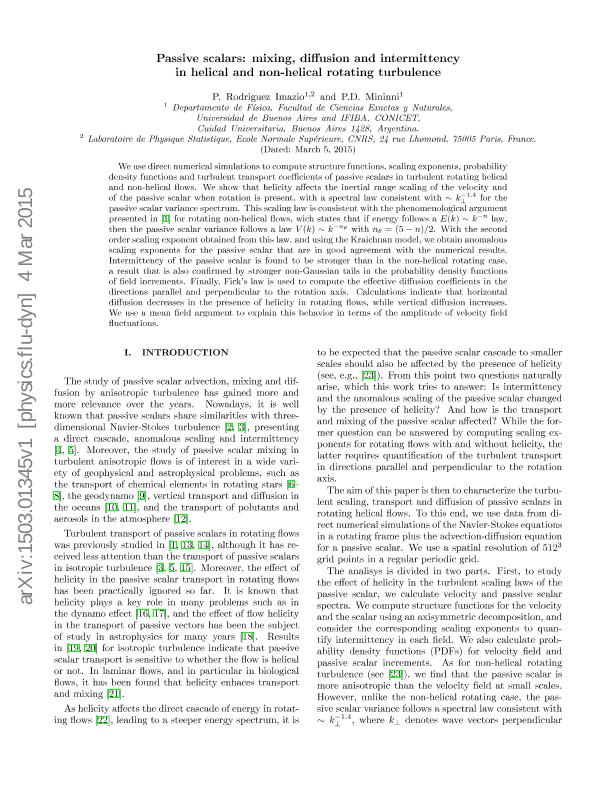Mostrar el registro sencillo del ítem
dc.contributor.author
Rodriguez Imazio, Paola Carolina

dc.contributor.author
Mininni, Pablo Daniel

dc.date.available
2018-11-14T17:51:36Z
dc.date.issued
2017-01
dc.identifier.citation
Rodriguez Imazio, Paola Carolina; Mininni, Pablo Daniel; Passive scalars: Mixing, diffusion, and intermittency in helical and nonhelical rotating turbulence; American Physical Society; Physical Review E; 95; 3; 1-2017; 1-14
dc.identifier.issn
2470-0053
dc.identifier.uri
http://hdl.handle.net/11336/64484
dc.description.abstract
We use direct numerical simulations to compute structure functions, scaling exponents, probability density functions, and effective transport coefficients of passive scalars in turbulent rotating helical and nonhelical flows. We show that helicity affects the inertial range scaling of the velocity and of the passive scalar when rotation is present, with a spectral law consistent with ∼k'-1.4 for the passive scalar variance spectrum. This scaling law is consistent with a phenomenological argument [P. Rodriguez Imazio and P. D. Mininni, Phys. Rev. E 83, 066309 (2011)PLEEE81539-375510.1103/PhysRevE.83.066309] for rotating nonhelical flows, which follows directly from Kolmogorov-Obukhov scaling and states that if energy follows a E(k)∼k-n law, then the passive scalar variance follows a law V(k)∼k-nθ with nθ=(5-n)/2. With the second-order scaling exponent obtained from this law, and using the Kraichnan model, we obtain anomalous scaling exponents for the passive scalar that are in good agreement with the numerical results. Multifractal intermittency models are also considered. Intermittency of the passive scalar is stronger than in the nonhelical rotating case, a result that is also confirmed by stronger non-Gaussian tails in the probability density functions of field increments. Finally, Fick's law is used to compute the effective diffusion coefficients in the directions parallel and perpendicular to rotation. Calculations indicate that horizontal diffusion decreases in the presence of helicity in rotating flows, while vertical diffusion increases. A simple mean field argument explains this behavior in terms of the amplitude of velocity fluctuations.
dc.format
application/pdf
dc.language.iso
eng
dc.publisher
American Physical Society
dc.rights
info:eu-repo/semantics/openAccess
dc.rights.uri
https://creativecommons.org/licenses/by-nc-sa/2.5/ar/
dc.subject
Turbulence
dc.subject
Fluid Dynamics
dc.subject
Transport
dc.subject.classification
Astronomía

dc.subject.classification
Ciencias Físicas

dc.subject.classification
CIENCIAS NATURALES Y EXACTAS

dc.title
Passive scalars: Mixing, diffusion, and intermittency in helical and nonhelical rotating turbulence
dc.type
info:eu-repo/semantics/article
dc.type
info:ar-repo/semantics/artículo
dc.type
info:eu-repo/semantics/publishedVersion
dc.date.updated
2018-10-23T18:18:02Z
dc.journal.volume
95
dc.journal.number
3
dc.journal.pagination
1-14
dc.journal.pais
Estados Unidos

dc.journal.ciudad
Nueva York
dc.description.fil
Fil: Rodriguez Imazio, Paola Carolina. Consejo Nacional de Investigaciones Científicas y Técnicas. Oficina de Coordinación Administrativa Ciudad Universitaria. Instituto de Física de Buenos Aires. Universidad de Buenos Aires. Facultad de Ciencias Exactas y Naturales. Instituto de Física de Buenos Aires; Argentina
dc.description.fil
Fil: Mininni, Pablo Daniel. Consejo Nacional de Investigaciones Científicas y Técnicas. Oficina de Coordinación Administrativa Ciudad Universitaria. Instituto de Física de Buenos Aires. Universidad de Buenos Aires. Facultad de Ciencias Exactas y Naturales. Instituto de Física de Buenos Aires; Argentina
dc.journal.title
Physical Review E
dc.relation.alternativeid
info:eu-repo/semantics/altIdentifier/url/https://doi.org/10.1103/PhysRevE.95.033103
dc.relation.alternativeid
info:eu-repo/semantics/altIdentifier/doi/http://dx.doi.org/10.1103/PhysRevE.95.033103
Archivos asociados
